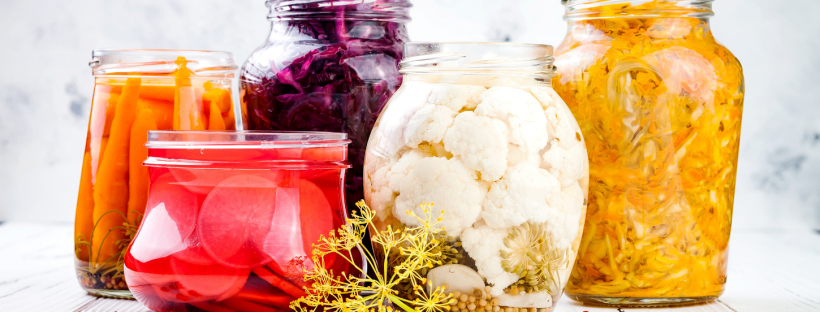Don’t get yourself in a pickle over fermented foods. Here’s everything you need to know about the trend soaring in popularity and its digestive benefits

Were you part of the 222% increase in internet searches for “pickling” during lockdown? Or perhaps you were responsible for one of the #fermentedfoods posts which have reached over half a million on Instagram. Yes, despite being around for centuries, fermented foods are soaring in popularity.
With research claiming they offer myriad health benefits, such as stronger immunity, better mental health and, particularly, improved digestion, it’s no wonder they have made a comeback as a food mega-trend.
But, how much do we really know about them and what impact can they have on our gut health?
Thankfully, registered nutritional therapist, naturopath and co-founder of wellbeing company ARDERE, Lauren Windas is here to provide the lowdown on fermented foods. And if you’re in a pickle (sorry — I just had to) about which to try, we’ve got that covered too.
What are fermented foods?

Fermented foods have been consumed for thousands of years and fermentation was an ancient technique for preserving food before the introduction of refrigeration.
While there is a fine line between fermentation and rotting, the results of the two processes are very different. Rotting is an uncontrolled act of food decomposing resulting in the production of harmful bacteria. Whereas fermentation is a controlled process involving placing the food in an anaerobic environment (an environment starved of oxygen) which encourages beneficial bacteria, known as probiotics, to grow and flourish, says Lauren. This preserves the food and helps it last longer.
“Simply put, fermentation is the chemical breakdown of a substance by bacteria, yeasts, or other microorganisms,” Lauren adds.
Lauren’s favourite fermented foods
- Sauerkraut — made from cabbage and salt.
- Kimchi — sauerkraut’s Korean cousin, a spicy fermented cabbage dish.
- Kefir — a fermented milk drink.
- Miso — a fermented paste made from soybeans, barley or rice.
- Sourdough — slow-fermented bread made by fermenting the yeast naturally present in flour.
- Tempeh — a protein-rich soy food made from fermented soybeans formed into patties.
What do fermented foods taste like?

In the past, people have said fermented foods have a signature sour tang and kefir (a fermented milk drink) has been likened to drinkable yoghurt. Some even claim fermentation enhances the flavour of food.
In Lauren’s opinion, fermented foods can taste a little sour, especially if you’re new to them. However, she says some people love the taste from the start as they can pack a real punch of flavour. If you’re not convinced, Lauren’s advice is to stick with it.
“While they can feel like an acquired taste, it just takes some getting used to,” she says.
Lauren recommends adding kimchi or sauerkraut in a taco dish or as a side to your eggs on toast.
“That way, the flavours will definitely grow on you!”
How do fermented foods benefit our gut health?

This comes back to the beneficial bacteria which I mentioned earlier.
“Fermented foods are high in probiotics (beneficial bacteria),” explains Lauren, “by consuming fermented foods you are therefore adding this beneficial bacteria into your digestive system, which can work to enhance your gut health by aiding digestion and supporting anti-inflammatory activity in the body.”
Evidence shows fermentation helps break down nutrients in food, making them easier to digest than their unfermented counterparts.
Lauren says gut bacteria also have a significant impact on the body’s immune system, 70% of which actually resides in the gut itself. Therefore, fermented foods and their probiotic qualities can boost your immune system, reduce your risk of illness and contribute to your overall wellbeing.
She adds: “Many fermented foods are also rich in fibre which feed bacteria and produce short-chain fatty acids (SCFA’s), which have anti-inflammatory effects on the gut lining.”
Can eating fermented foods help with specific digestive conditions?

Consuming fermented foods can be particularly beneficial in helping reduce symptoms of irritable bowel syndrome (IBS).
These foods can help with dysbiosis (an imbalance of bacteria) in the gut which is a known driver of IBS, says Lauren, they can also help reduce inflammation which is also a key contributor to irritable bowel syndrome.
What’s more, one study consisting of 274 adults with constipation-predominant IBS, who consumed 4.4 ounces (125 grams) of yoghurt-like fermented milk daily over a period of six weeks, experienced improved IBS symptoms, including bloating and stool frequency.
However, Lauren explains that slow and steady wins the race, here.
“If you suffer from IBS or irritable bowel disease (IBD) and you are wanting to introduce fermented foods, it’s important that you introduce small amounts, slowly over time. This is because the FODMAP content in some fermented foods can exacerbate symptoms such as bloating and gas, which happens as a result of gas being produced when gut bacteria munch on these fibres inside the intestines.”
Why should we be eating more fermented foods?

Lauren says to think as if “we are dining with our gut microbes every time we eat.” Imagine our gut microbes are like plants within our garden that we need to regularly tend to and help grow, she adds.
She would encourage us to eat more fermented foods because they help to nurture our inner garden and support our overall wellbeing.
Gut-friendly Kimchi

Lauren has kindly shared her Kimchi recipe exclusively with The Gut Choice.
Serves: 10 | Time: 1hr 15 mins | Dietary attributes: Vegetarian, Vegan, Dairy-Free, Gluten-Free, Nut-Free, Soy-Free, Paleo, Pescatarian
Ingredients:
- 1 white cabbage or napa cabbage (700g)
- 600g-800g carrots (peeled & cut into matchsticks or bite-sized pieces)
- 8 spring onions (finely chopped)
- 3 tbsp sea salt
- 5 garlic cloves (finely chopped)
- 40g piece of ginger (finely chopped)
- 4 tbsp Korean chilli powder (“I can never seem to find it in the local supermarket, so I usually use chilli flakes which are less spicy,” says Lauren)
- 400ml cold filtered water
- Air-lock preservative jar (that holds 4 pints) or multiple small jars
- 6 red chillis (finely diced, optional)
Method:
- Before you begin, sterilise your glass jar(s). Here’s a quick and easy way to do this.
- Remove the outer layer of the cabbage and wash the cabbage. Chop the cabbage in half, removing and binning the heart (stalk). Then, chop the cabbage into thin strips.
- Place the cabbage strips in a large mixing bowl and sprinkle on the sea salt. With clean hands, massage the salt into the cabbage until the cabbage begins to sweat (approx. 5 mins).
- Next, add the filtered water over the cabbage, then place a sterilised plate over the top to help keep the cabbage submerged. Leave for 1 hour.
- Drain the cabbage, setting the brine aside and place the cabbage back in the large bowl.
- Add the carrots, spring onion, ginger, garlic, chilli flakes and chillies to the cabbage. Mix well.
- Spoon the mixture into your jar(s) and compress down using a wooden spoon (non-metal).
- Now, add the brine that was set aside. If it doesn’t cover all of the vegetables, add some more filtered water (with 2% salt) until it’s all covered.
- Close with the lid(s) and allow to ferment at room temperature for 1 to 4 weeks. Check the kimchi each day, removing any foam/mould that might have developed at the surface (completely normal) and push the vegetables with your wooden spoon down into the brine, ensuring they are always submerged. Once it’s to your taste, place in the fridge. It will keep for approximately two to three months.
Recipe credit: nutritionist, naturopath and co-founder of wellbeing company ARDERE, Lauren Windas
What do you think about fermented foods? Have you got any faves? Get in touch.
The Gut Choice advise consulting a medical professional or registered nutritionist or dietitian if you have any digestive concerns or symptoms or before making any alterations to your diet.

Fermenting and rotting, a fine line you don’t want to cross 😂
This is an excellent look at what fermented foods actually are and the potential benefits. I know there’s been a lot more interested in this area of late, but I’ve got to admit I don’t eat any. D’oh! I really should look into trying something. It’s another one of those things I think about doing but never get around to. Fab post as always lovely! xx
LikeLiked by 1 person
Definitely, haha! Aww thank you, Caz and thanks for reading. It’s definitely tricky fitting in trying new things within our busy lives and I don’t eat as many fermented foods as I’d like, so I understand how you feel. Don’t beat yourself up; I’m sure you do other great things to look after your health. 🙂 And, if you get around to making some of these fermented food dishes, like the Kimchi for instance, at least they make large quantities so you wouldn’t have to make them as often. 🙂
Gemma x
LikeLike
Thanks Gemma, this was a really helpful read. My kids asked me to explain Kimchi to them the other day and then I needed to explain fermented to them too (because well, you know) any way, all I can say is I’ve learnt a lot more accurate information from reading this and I’m also happy to have a good reason to indulge in sourdough!
LikeLiked by 1 person
Aww I’m glad you found it useful and it’s great that your kids are keen to understand this sort of thing from a young age. 🙂 Maybe they’ll be wanting you to make some Kimchi for them next, haha! Mmm, yes, sourdough is just scrumptious. Thanks for reading and for your kind comment Alex. 🙂
Gemma x
LikeLike